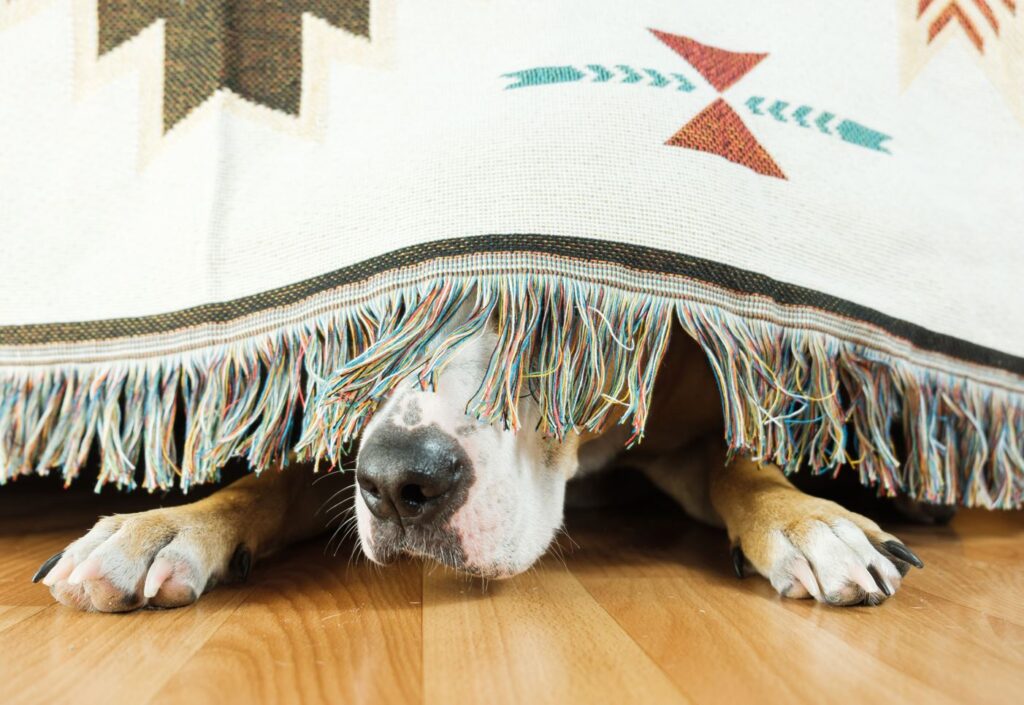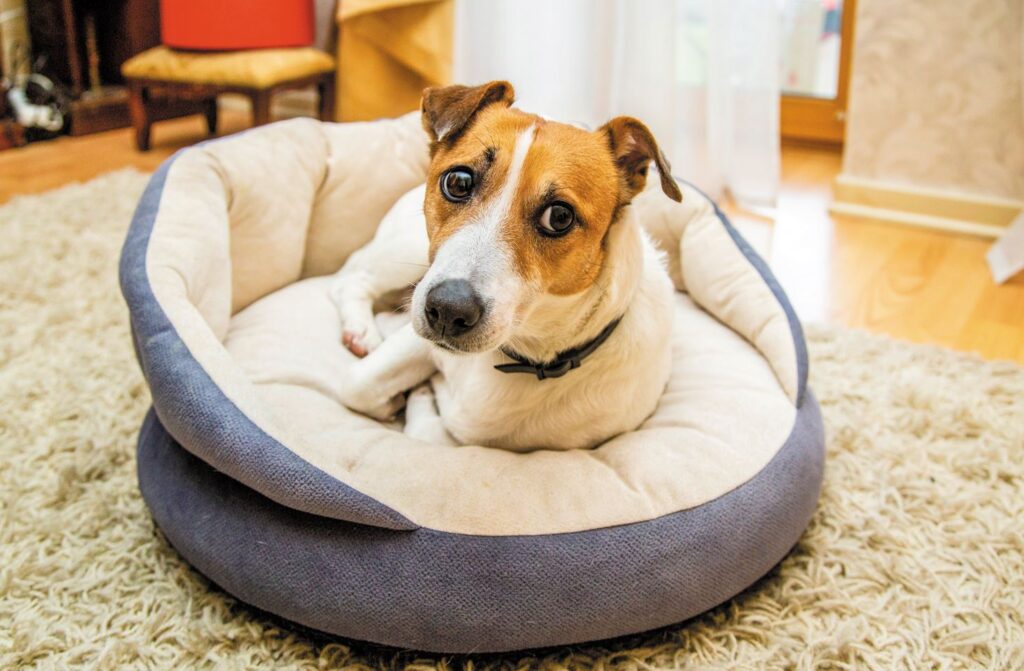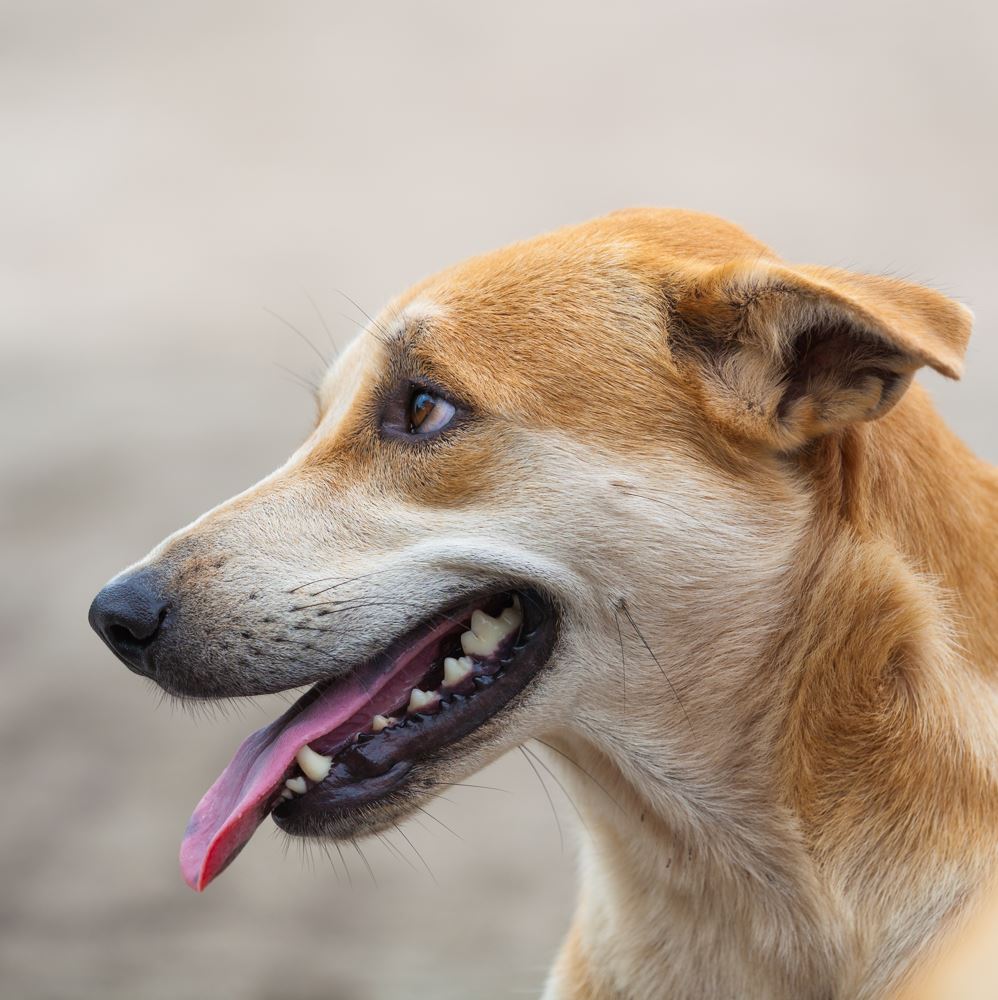What to Know About Dog Anxiety
Blog used with permission from Honest Paws

People can experience a range of anxiety symptoms – from a nervous heart flutter to a full-on panic attack. Having anxiety is one of the many ways dogs are like their pet parents. Just like us, their nervousness is normally nothing to worry about. It’s quite understandable that your pup may be a bit anxious when meeting people for the first time, or encountering a new situation.
With a little reassurance, your pooch will often quickly calm down. However, if dog anxiety is not addressed properly, or if there’s some underlying trauma at play, your pet’s anxiety could become a serious matter that takes time and energy to remedy. Read on to find out what you need to know about anxiety in dogs and how to help your pooch overcome this problem.
What is Anxiety in Dogs?

Basically, having anxiety is about being fearful or worried about something. It’s a natural emotion that helps alert us to danger, but it can be problematic in other circumstances. Dogs are pack animals and view their human family members part of their pack.
They feel safe with others around so it’s not unexpected that feelings of anxiety will surface when they’re left alone. This is called separation anxiety and is one of the typical forms of anxiety in dogs.
Our canines do best when they know what to expect. Therefore, anxiety may also become an issue if they’re dealing with a significant change in their environment, or too many changes at once. This means there can be a variety of reasons why your fur baby has developed anxiety.
Causes of Anxiety in Dogs
Some dogs have a generally calm disposition and will be less bothered by particular events than other canines might. Having said that, there are a number of common causes of anxiety in dogs. Keep in mind that there may be more than one reason for your pet’s anxiety.
Thunder
Many dogs will become anxious when they hear loud noises like thunder. Interestingly, dogs can sense a drop in barometric pressure so they may disappear when they know there’s a storm coming. You might find your pooch cowering in the bathtub or under a bed in this circumstance. Other loud noises, like fireworks, will produce the same reaction.
Crowds
Being in a crowd can be anxiety-provoking for your pooch. That’s because they don’t know what to expect in this environment. Crowds can be noisy and confining. This qualifies as an unfamiliar situation where, in your dog’s mind, anything can happen. Your pup may also worry about being separated from you.
Social
Is your dog anxious when they’re around new people or other dogs? There may be a traumatic event in their past that’s affecting their behavior.
Maybe your dog has been rescued and the full extent of their history is unknown. Canines who aren’t socialized properly may have anxiety around other dogs and humans. They’re often simply not used to being with anyone else aside from their family members.
Traveling
Despite the photos you see of dogs enjoying the breeze with their heads out the car window, not all dogs like car rides. It may cause anxiety in some dogs since they don’t know where they’re going – it could be a visit to the vet or to the boarding kennel.
Perhaps they’ve had a bad experience such as being confined in an uncomfortable space in the vehicle, or arriving at a destination that caused them anxiety.
Dog Anxiety Symptoms
Certainly, each dog is an individual and they’re apt to show different symptoms of anxiety. You may also see several of the following signs together.
In addition, some cases of anxiety will be more severe than others. And, symptoms that appear only once or twice could suggest that Rover or Rosie just didn’t get enough exercise or mental stimulation that day.
If behaviors persist or escalate to more destruction or aggression, you’re likely dealing with a case of anxiety that needs to be resolved. Plus, you don’t want your fur baby to injure themselves or others with their actions.

Here’s a list of dog anxiety symptoms to look out for:
- Aggression
- Barking
- Compulsive or repetitive behavior
- Depression
- Destroying things
- Drooling excessively
- Ears back
- Escaping or trying to
- Panting
- Pacing
- Refusing food
- Restlessness
- Tail tucked in
- Trembling or shaking
- Urinating or defecating inside
- Whining
Treatment Options for Dog Anxiety
Before you embark on using any treatment, it’s a good move to rule out the possibility that an underlying medical issue is causing your dog’s symptoms. Enlist the assistance of your vet to make sure your doggo is healthy. If the investigation suggests that your pup has anxiety, your veterinarian can assist you to put together an appropriate treatment plan.
This may include medications as well as some of the ideas below. Most successful plans of action will involve a number of different methods, all focused on encouraging your dog to relax. Here are some things your vet may suggest.
CBD Oil
More and more, pet owners are discovering the benefits of CBD oil for dogs to reduce anxiety. This natural compound found in the hemp plant is extracted and made into a selection of safe pet oils and treats. If you are unfamiliar with CBD, check out this useful guide. Honest Paws CBD products are sold at all Best Friends Pet Hotel locations. The Calm line is design to help with anxiety.

Desensitization
There are things you can do to desensitize your dog to triggers that raise their anxiety level. For instance, if Snoopy or Stella shows signs of worry when you prepare to leave the house, pick up your keys and grab your bag like you’re heading out then put everything back again.
You can try desensitizing your canine friend to loud sounds by making quieter sounds and gradually moving up to louder sounds. As your pet gets used to these triggers, they’ll find them less anxiety-provoking.
Counter Conditioning
Counter conditioning builds on desensitization by training your doggo to judge stressors as a positive thing rather than a matter to be anxious about. Essentially, you offer your dog something good when their anxiety is triggered.
This could mean that whenever they hear thunder you give them a treat. If they have separation anxiety, when you leave the house put a food puzzle out for them to enjoy while you’re away. Your canine will start to anticipate getting something nice when these stressors happen.
Distraction
Taking your dog’s mind off whatever is causing them distress is a good move. You might try getting their attention with a treat, food puzzle, a toy, or engaging them in doing a few tricks.
The key is to have your pooch focus on something else and not on whatever is causing their anxious thoughts. Make an effort to pick a distraction that is sure to please them and mix things up as often as you have to in order to keep their attention.
Music Therapy
Some dogs enjoy a little background noise so that they don’t feel alone. Soothing music can also help calm your pooch. Would you believe that there are actually audio tracks available specifically for canines? Try a few selections and see what your pet responds to best.
Touch and Massage
You know the favorite places on your pup’s body where they enjoy your touch. Maybe an ear rub is what they respond to or they really like a back scratch. Think about how touch relaxes them. Use this to combat their anxiety and kick it up a notch with a nice doggie massage.
Training
There may be an advantage to hiring a professional dog trainer to encourage your pup to get over their anxiety. This is especially true if your pooch is showing aggression when under stress.
Look up any Certified Applied Animal Behaviorists (CAAB or ACAAB) in your area to see what services they have available. This is another instance where your veterinarian may be able to advise you.
Safety and Comfort
All dogs need comfortable safe places where they can relax and nap undisturbed. A soft pet bed and a favorite blanket can be used to bring their stress level down.
You can even buy heated pads for them to lie on to provide more comfort. Encourage your dog with praise and the odd treat when you see them taking a break in their safe space.
They’ll quickly begin to associate this with feeling protected and understand that it’s somewhere to soothe themselves when feeling anxious. A crate can also provide safety and comfort if it’s used this way.

Frequently Asked Questions
How do you treat a dog with anxiety?
Treating dog anxiety usually involves a number of different methods such as CBD oil, counter conditioning, distraction, music therapy and more.
What are signs of anxiety in dogs?
Symptoms of dog anxiety run the gamut from changes in body language involving the ears and tail to behaviors such as whining and urinating inside.
How can I calm my dog’s anxiety naturally?
Offering nutritional supplements, providing exercise and mental stimulation, and socializing your dog are a few things you can try.




